COLLINGWOOD had been the far more dominant of the two Grand Final combatants during the 2010 home and away season.
The Pies had finished two games clear of the Saints, and then put the fourth-placed Bulldogs and second-placed Cats to the sword in their two finals. The Saints, on the other hand, had escaped with a lucky win over Geelong in their Qualifying Final. Similarly in their Preliminary Final, they had trailed the Western Bulldogs at half-time, before prevailing by 24 points on the back of one solid quarter in which they had kicked seven goals to the Dogs' one.
In the lead-up to the Grand Final, anyone associated with the Saints would have sought solace in the fact that the Premiership is not always won by the dominant side of the season. In fact, the previous two years had demonstrated that starkly. Geelong was on the verge of defending its Premiership almost perfectly in 2008, but nerves—particularly in front of goal—got the better of the Cats in the Grand Final and they succumbed, despite having nine more scoring shots than Hawthorn. The following season St Kilda almost matched the dominance of the Cats a year earlier, but also kicked dreadfully in the decider and fell agonisingly short, having also taken more shots at goal than its opponent, Geelong.
The Pies took to the MCG as the more dominant of the two Grand Final teams. All pictures: AFL Photos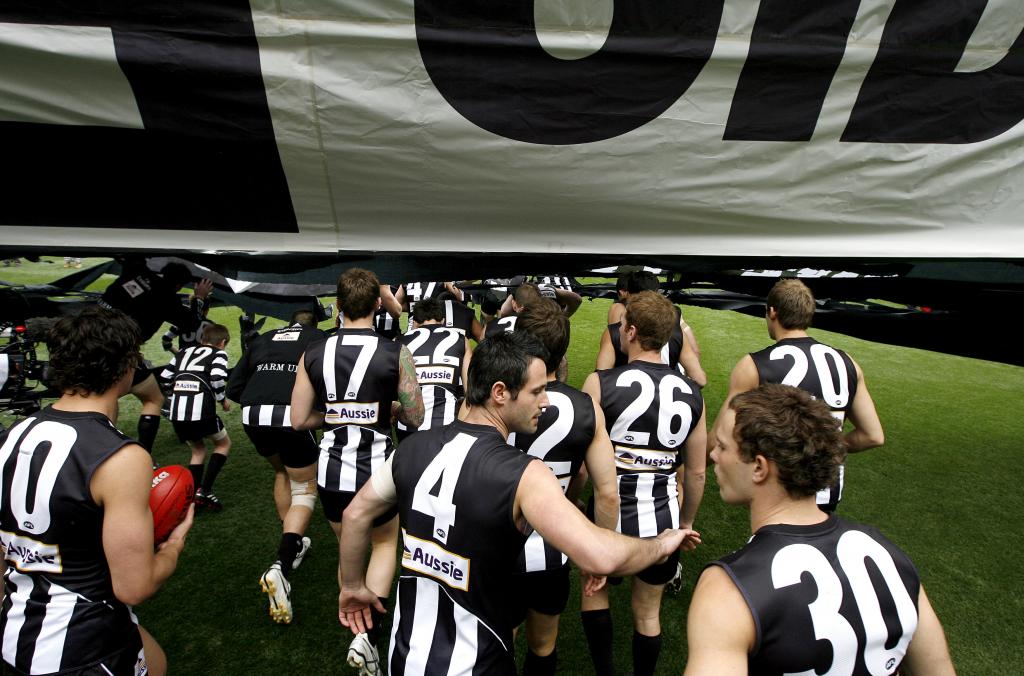
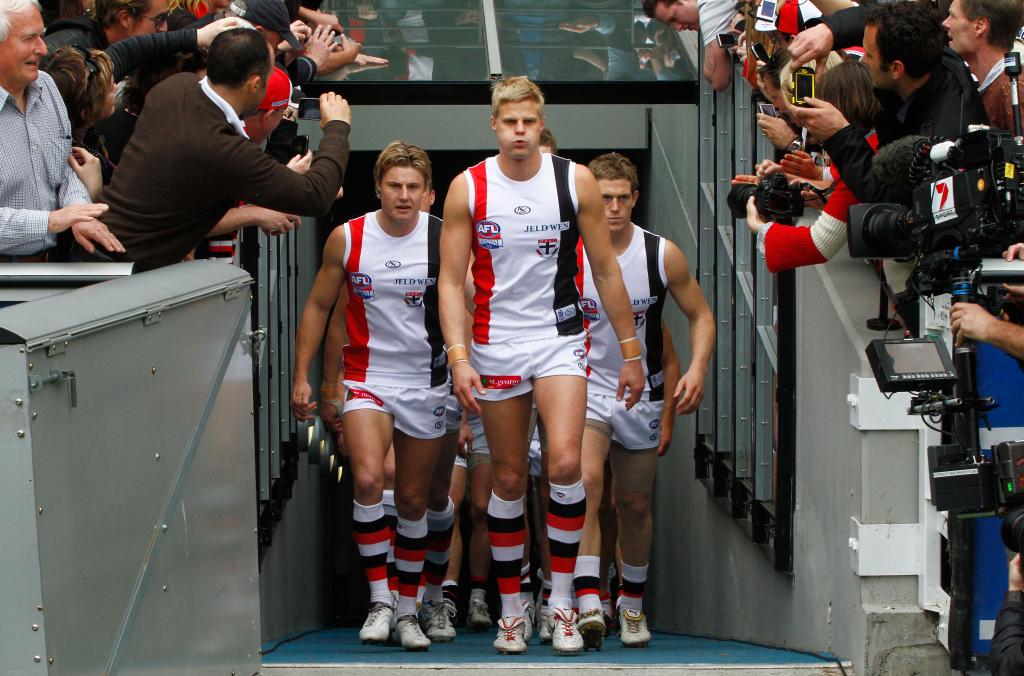
Stop the presses
Tactically, both Collingwood and St Kilda brought to the Grand Final their own version of what was known as the 'forward press'. It had become what Martin Blake described in The Age as the "tactic du jour". Borrowing heavily from basketball, it involved the practice of most—if not all—players pushing forward rather than back when the opposition had the ball deep in its defence. The practice would have been nigh on impossible back in 1990, but with players' fitness and endurance levels having skyrocketed over the past couple of decades, it had become a notionally defensive weapon capable of creating repeat offensive opportunities.
Collingwood and St Kilda, in 2009 and 2010, had been the tactic's two best exponents, the Saints perhaps more so in 2009 and the Pies almost certainly in 2010; in the latter season, Collingwood's average tackle count inside the forward 50 ranked No.1 in the League.
Brendon Goddard (l) and Luke Ball lock arms.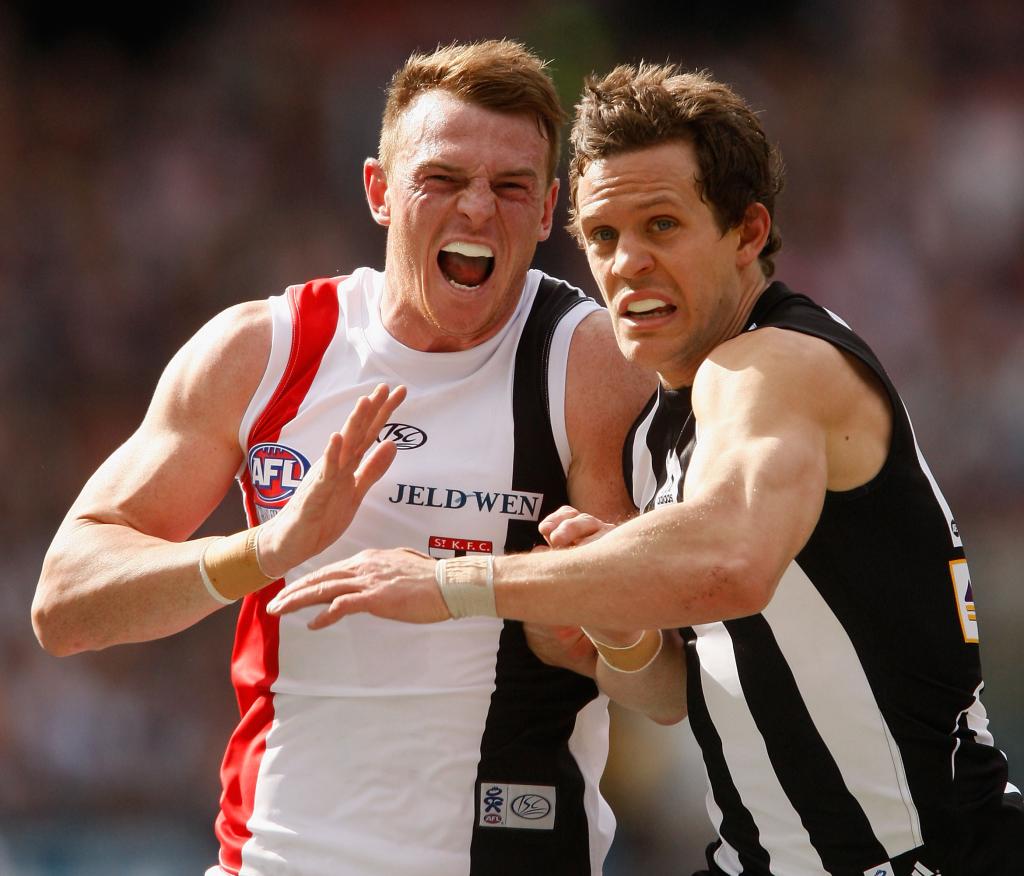
But while the methodology had played a huge part in the Saints and Magpies attaining the top two positions in the League's 2010 defensive rankings, Collingwood's ability to score was clearly superior. The Saints had an average of 72 points kicked against them in the home and away rounds of 2010, and the Magpies were not far behind with 75, but in attack the Pies averaged 19 more points per game than St Kilda.
A weakness in the Saints' game plan
Under Ross Lyon—who had taken on the St Kilda coaching role in 2007, after serving an apprenticeship under Paul Roos at Sydney—the Saints developed a defence-first ethos. Where Malcolm Blight's coaching philosophy during his tenures at Geelong and then Adelaide had been a case of 'Let the opposition kick as many goals as they like, just make sure you kick at least one more', Lyon's was diametrically opposed. Notably, across 2009 and 2010, Lyon's St Kilda teams, while generally holding opponents to lower-than-average scores, had over time seemingly lost the ability to manufacture big scores themselves. The Saints registered scores of over 100 points in six of their first seven matches in 2009, but could do so only another six times for the remainder of the season. In 2010, they produced a total of only seven three-figure totals, and three of those came in a purple patch in August, against Port Adelaide, North Melbourne and Richmond, none of which were Finalists. Significantly, St Kilda had never cracked the 'ton' in a final during the 2009-2010 period.
Lyon's Saints were ferocious defenders, but could they kick big scores themselves? 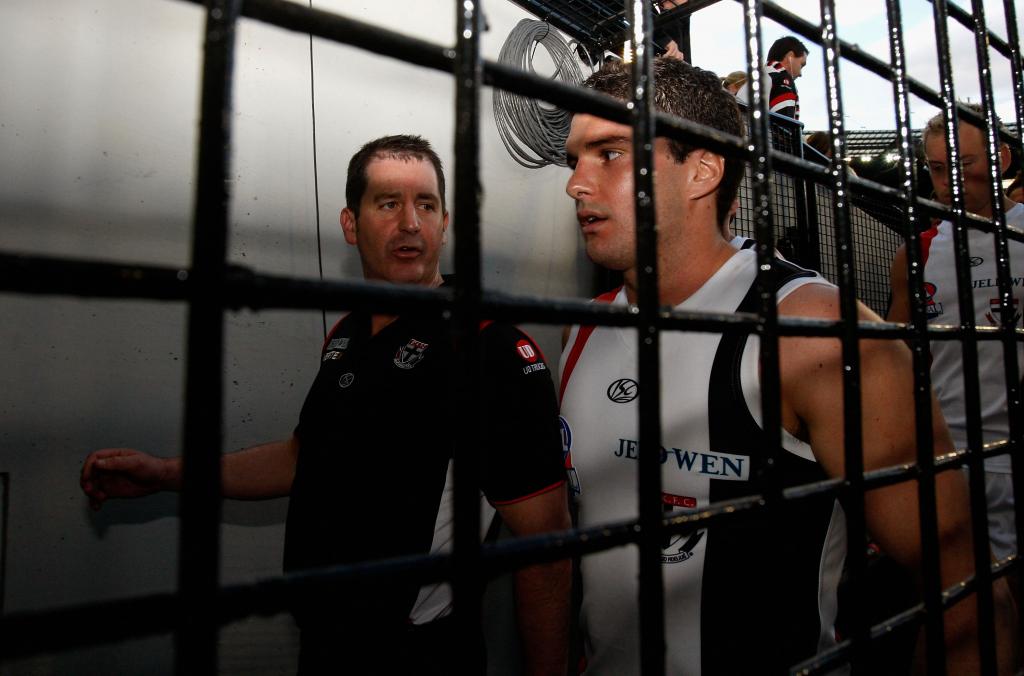
While there was nothing inherently wrong with a miserly side failing to score big, the numbers did speak of a small weakness in Lyon's philosophy. On the one hand, a low-scoring encounter virtually guaranteed your team was never out of a match. On the other, it also ensured your opponent remained 'in the hunt'. The 2009 Grand Final had been a decent illustration of this problem; St Kilda was the better side the majority of the first three quarters against Geelong, but an inability to convert that advantage into regular goals meant the Cats were always within striking distance. At pivotal moments late in the match, luck perhaps favoured Geelong, and it scraped through for a win.
Magpies off to a flyer
As the first quarter of the Grand Final unfolded, the theory that Collingwood boasted a wider array of scoring options appeared sound. Darren Jolly got the Magpies off to the best possible start with a goal after only 24 seconds, and while Stephen Milne settled the Saints with a mark and goal six minutes later, Collingwood slipped away with majors to Jarryd Blair, Alan Didak and Dale 'Daisy' Thomas. Only 13 minutes into the match, the Magpies led by 19 points, and St Kilda would be condemned to play catch-up football for the rest of the game.
Thomas (l) celebrates his goal with teammate Alan Toovey.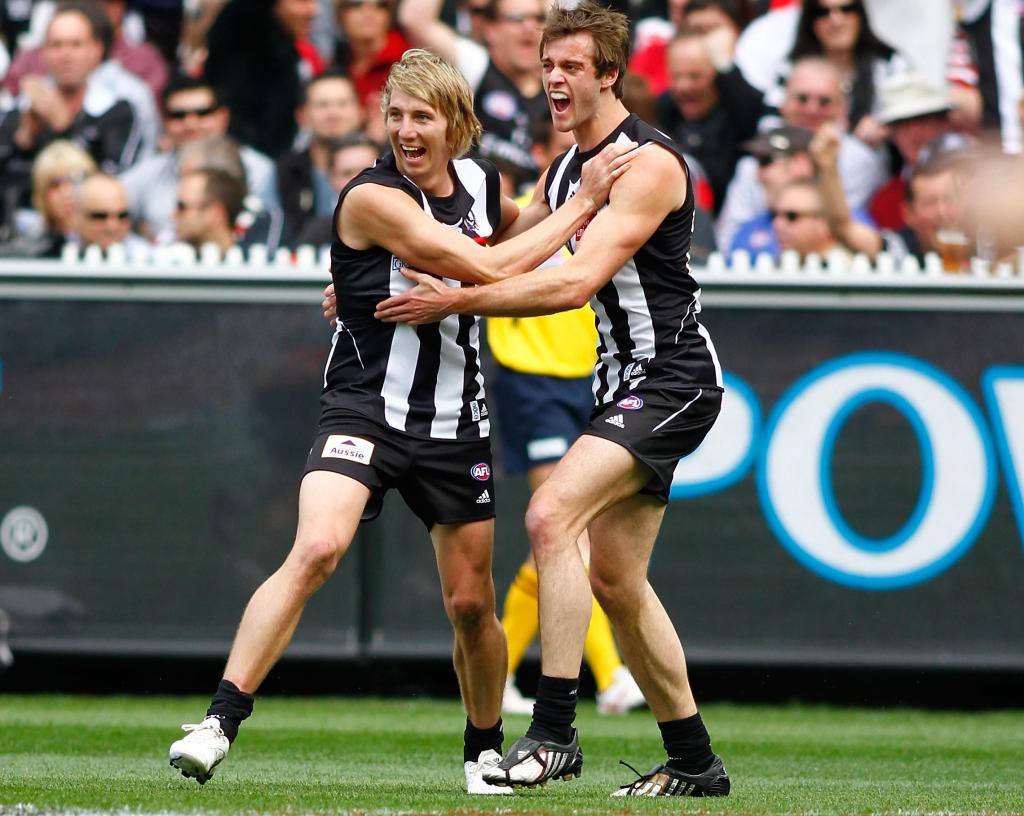
Somehow, the Saints managed to pick their way through Collingwood's stingy defence twice in the closing stages of the first quarter, and trailed by only a goal at the first break, but a long set shot goal from Justin Koschitzke at the 12-minute mark would prove their only score of the second term. The Magpies, on the other hand, pressed forward relentlessly, strangulating the Saints while producing multiple scoring opportunities. Those opportunities produced nine scores, but only three were goals. The last of those, to Harry O'Brien (who later changed his name back to his birth name, Heritier Lumumba), gave Collingwood a 22-point lead.
Lumumba, then known as Harry O'Brien, fired the Pies further ahead.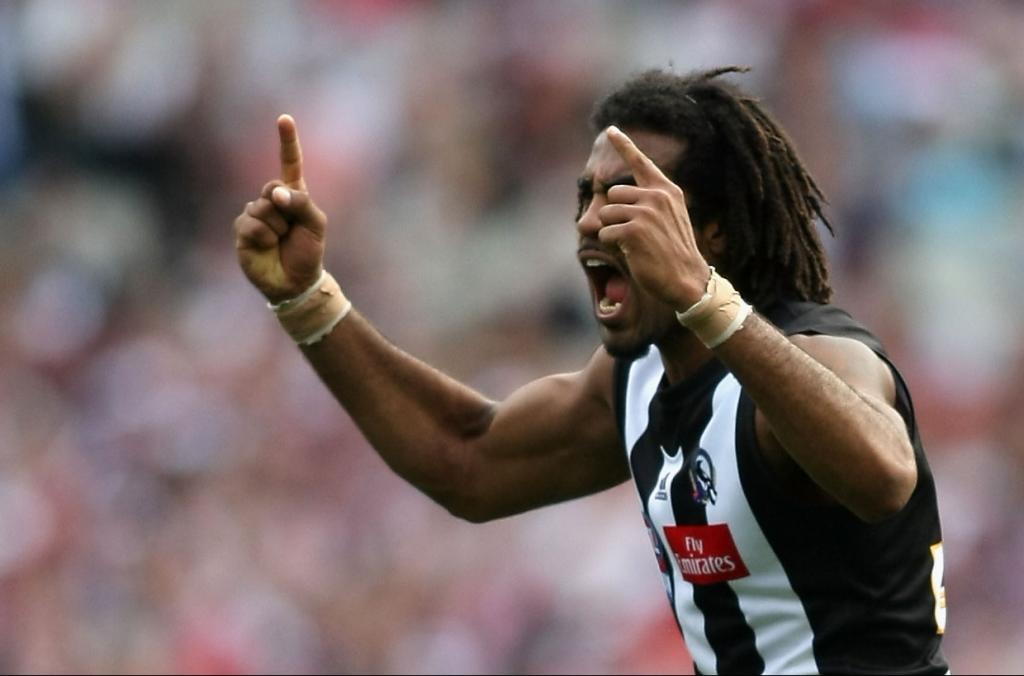
Travis Cloke had two chances to extend the lead to an almost unassailable margin in the following minutes, but fluffed them both. At the long break the Pies had all the momentum, but the 24-point margin left the door ever-so-slightly ajar for the Saints.
Senator, shut the f*** up!"
Some Collingwood fans felt the premiership was now a mere formality. One of those—federal senator Stephen Conroy—approached Pies president Eddie McGuire at half-time and said, "We've got this." A nervous McGuire, who had lived through too many Magpie Grand Final heartbreaks, could not contain himself, and responded angrily: "Senator, shut the f*** up!"
Coming down from the coach's box, Malthouse worried that his players might also have adopted Senator Conroy's mindset, and pleaded with them to maintain their focus, but when play resumed in the third quarter there was a discernable shift in the game's momentum.
Four minutes in, Saints skipper Nick Riewoldt kicked a captain's goal, throwing himself into a contest on the wing and then charging at full pace to the forward line to take a mark. After a follow-up goal from Brendon Goddard, St Kilda managed a third in a row through an unlikely source when defender Sam Gilbert snapped just his second major of the year
Riewoldt's captain's goal shifted the momentum in the Saints' favour.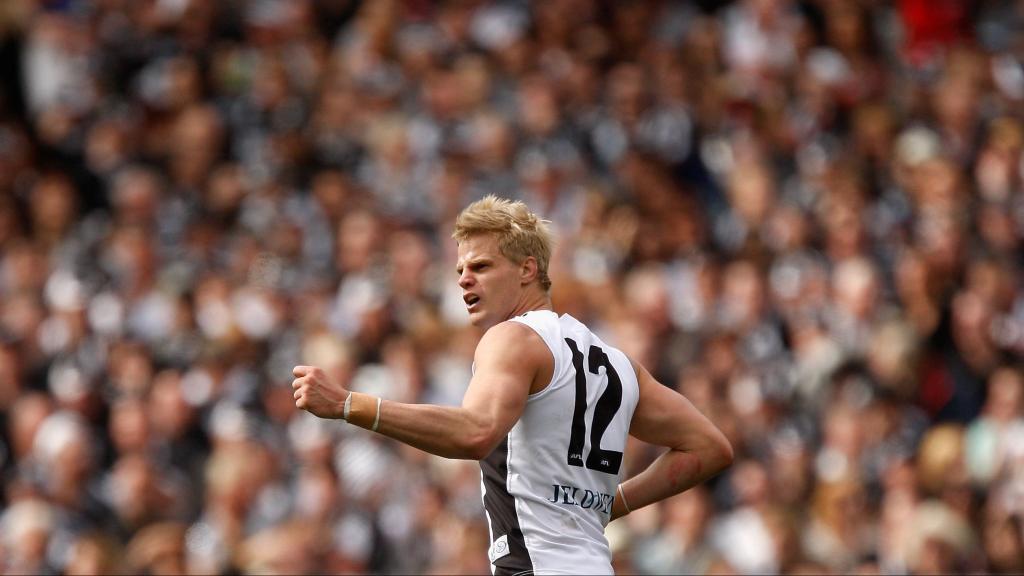
When the third quarter ended without Collingwood kicking a goal, the Saints were within eight points. It was the stuff of nightmares for McGuire, Malthouse and countless Magpies who'd had seen it all before.
The stuff of nightmares: Collingwood president McGuire.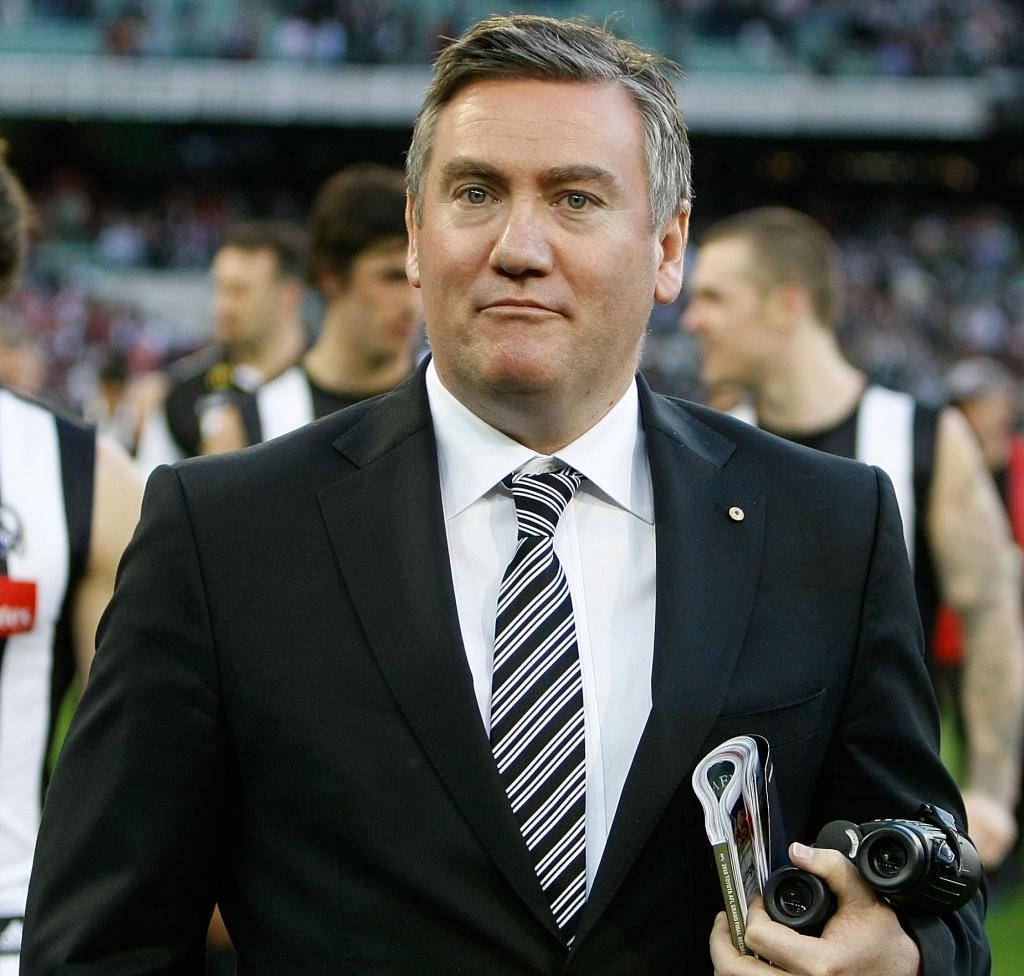
Pandemonium
For the first eight minutes of the final term, both sides pressed, pressed and pressed again. Neither could find a way to the goal line and the score remained as it had at three-quarter time: Collingwood 7.13 to St Kilda 7.5. It took a bit of magic from Magpie small forward Leon Davis, virtually unsighted all day, to break the deadlock. Having weaved his way through several players, Davis snapped a goal that restored a 14-point buffer. It was the Magpies' first major in more than 40 minutes of football.
Five minutes later, though, St Kilda hit back when Lenny Hayes—who had run tirelessly on his way to a 32-possession match—kicked a goal from beyond the 50-metre arc, which many considered to be just about the longest major of his career. Barely 90 seconds later Milne marked and kicked another. Soon the scores were level, and the minds of fans were drifting back to that infamous September afternoon in 1966.
The deadlock didn't last long. Less than a minute later Saints star Brendon Goddard leaped into the air and took one of the great Grand Final grabs, towering over Harry O'Brien and lifting St Kilda fans to their feet.
Goddard's soaring mark instantly earned its place in Grand Final folklore.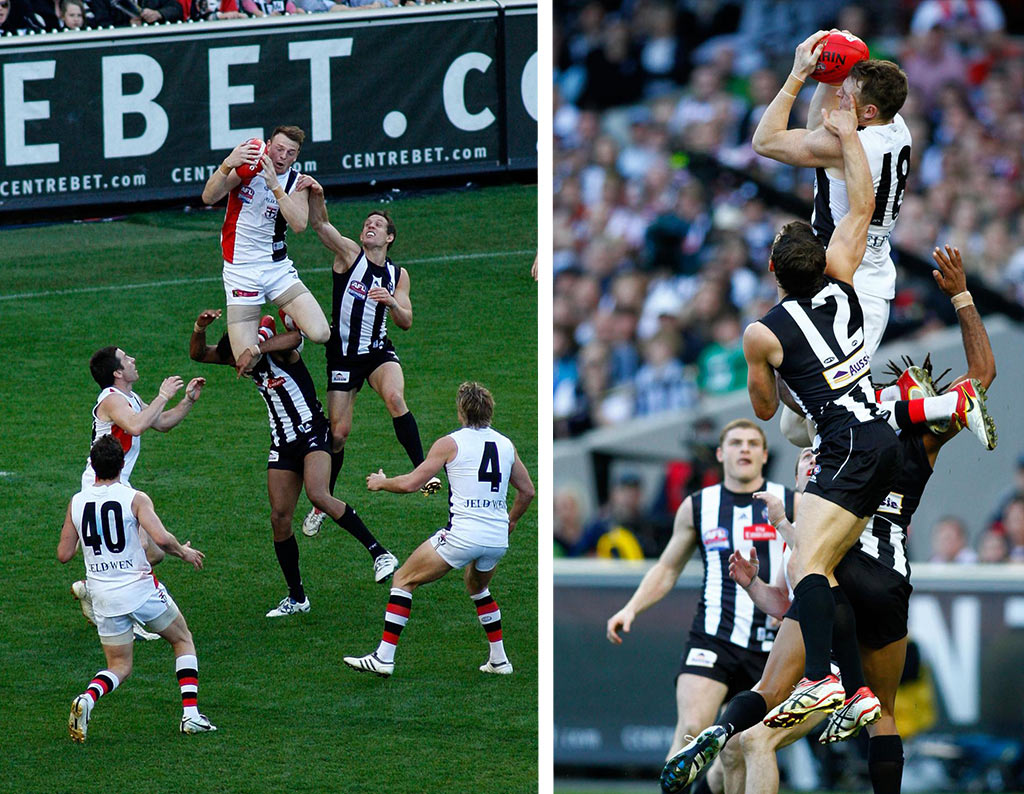
When Goddard converted his set shot, the Saints led for the first time and the MCG crowd had reached fever pitch. Further drama was not far off; from the ensuing centre bounce. Collingwood made a belated foray forward, which produced a shot at goal from Cloke. His kick fell short, but a rushed behind followed, bringing the Magpies to within five points. A handy behind?
A wicked break
The following four minutes were an arm-wrestle, and neither side scored. As St Kilda attacked once more, Collingwood captain Nick Maxwell decided to take a risk, leaving his man, Riewoldt, and reeling in a spectacular mark to match Goddard's. Maxwell's clearing kick found a teammate and the Magpies made their way to full forward, where Cloke swooped on a loose ball to goal and put Collingwood back in front by the narrowest of margins.
Not to be outdone by his direct opponent, Riewoldt took a courageous mark of his own on the wing soon after. His kick found Hayes, who slapped the ball onto his boot, setting into motion a dramatic Grand Final moment. From Hayes's kick, the ball tumbled towards the pocket with Milne and Magpie Ben Johnson in pursuit, before breaking left towards the St Kilda goal. With the ball now travelling between the goal and Milne, and Milne ahead of Johnson, the Saint would only need to grab the Sherrin and ram home a straightforward running goal to restore St Kilda's lead. But before he could get to it, the ball took a wicked break, this time to the right, and dribbled through for a behind. With 91 seconds left on the clock, scores were level again.
Amid the pandemonium, that capricious ball spent most of the final minute and a half hugging the boundary line, and one last attack by the Saints foundered against a wall of desperate Magpies. With a pack of players hovering over the ball, the siren sounded to signal the third drawn Grand Final in League history.
Pandemonium gave way to collective despair as the siren sounded.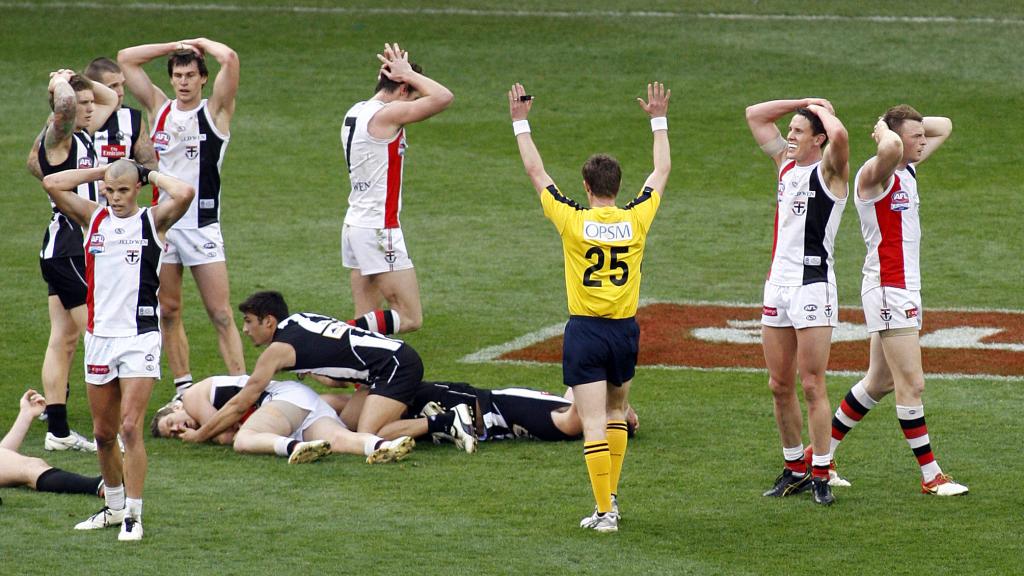
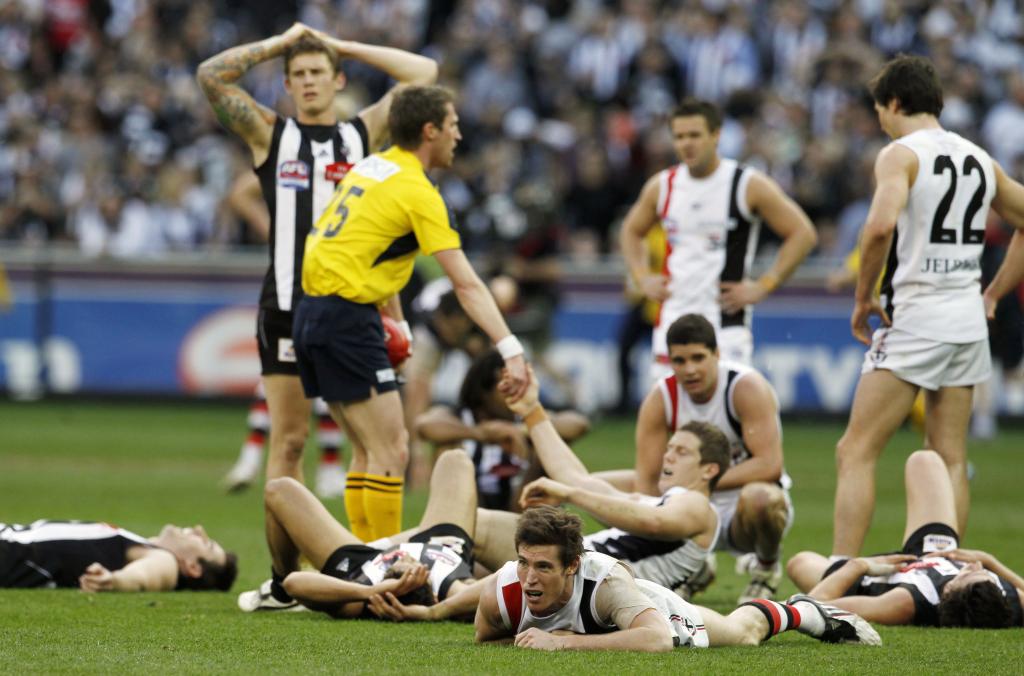
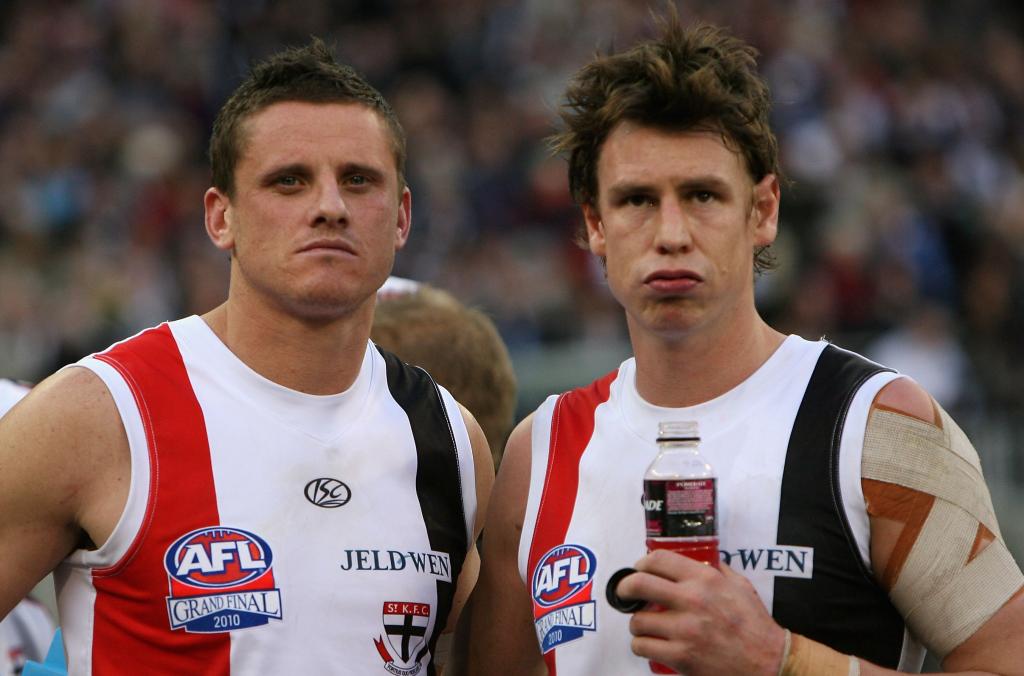
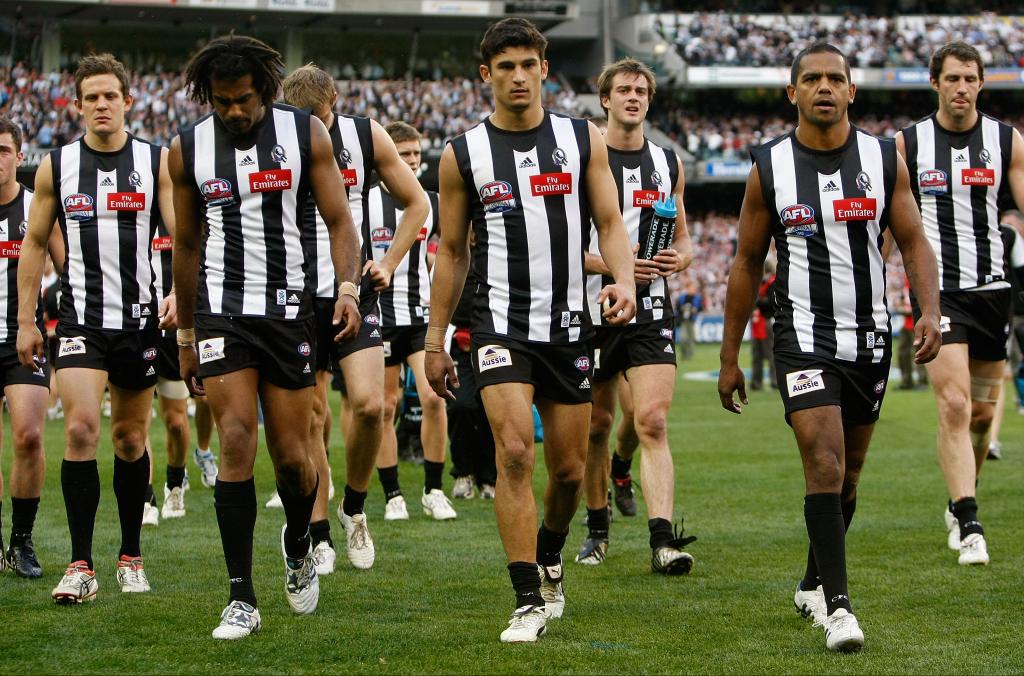
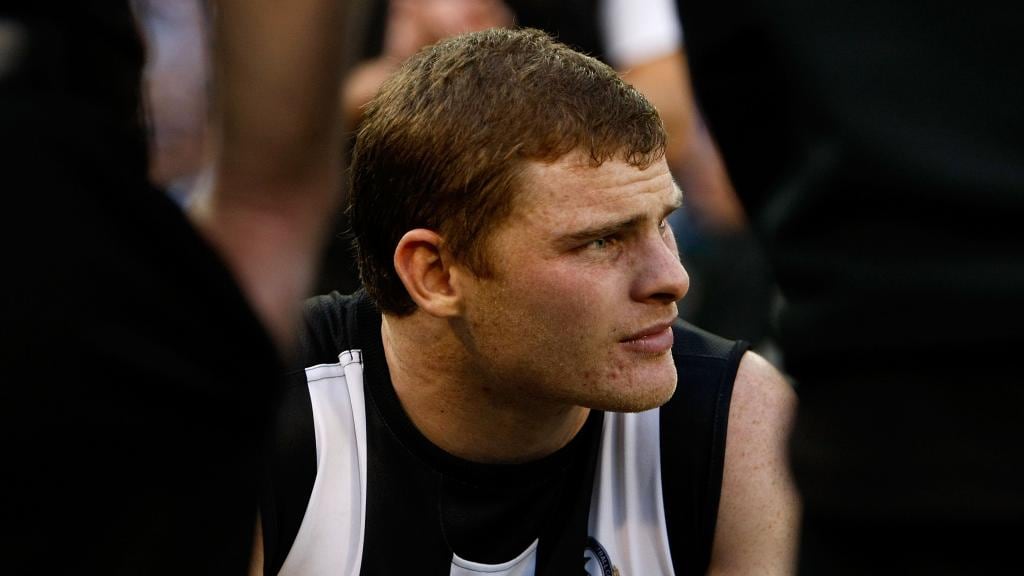
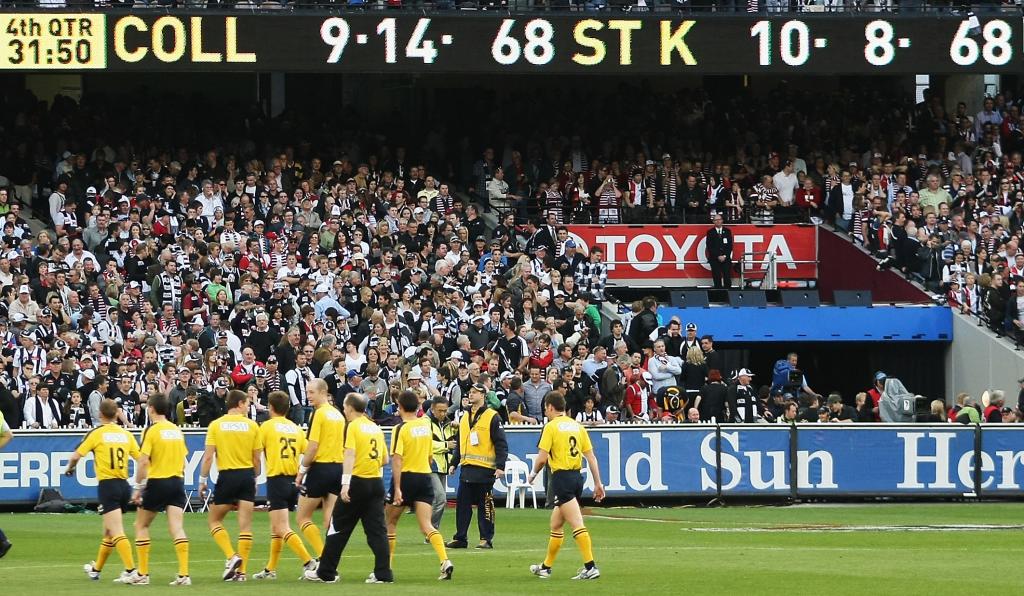
The speech that secured a flag?
The reactions of the team captains contrasted starkly. While Riewoldt joked with AFL CEO Andrew Demetriou about the extra revenue a replay would bring, Maxwell was livid, branding the lack of provision for extra time "a disgrace". A bemused Hayes accepted the Norm Smith Medal and trudged off the ground wondering what might have been if his hurried kick had found its way into Milne's hands after all.
A still-stunned Hayes accepts the Norm Smith Medal from Eagles great Peter Matera.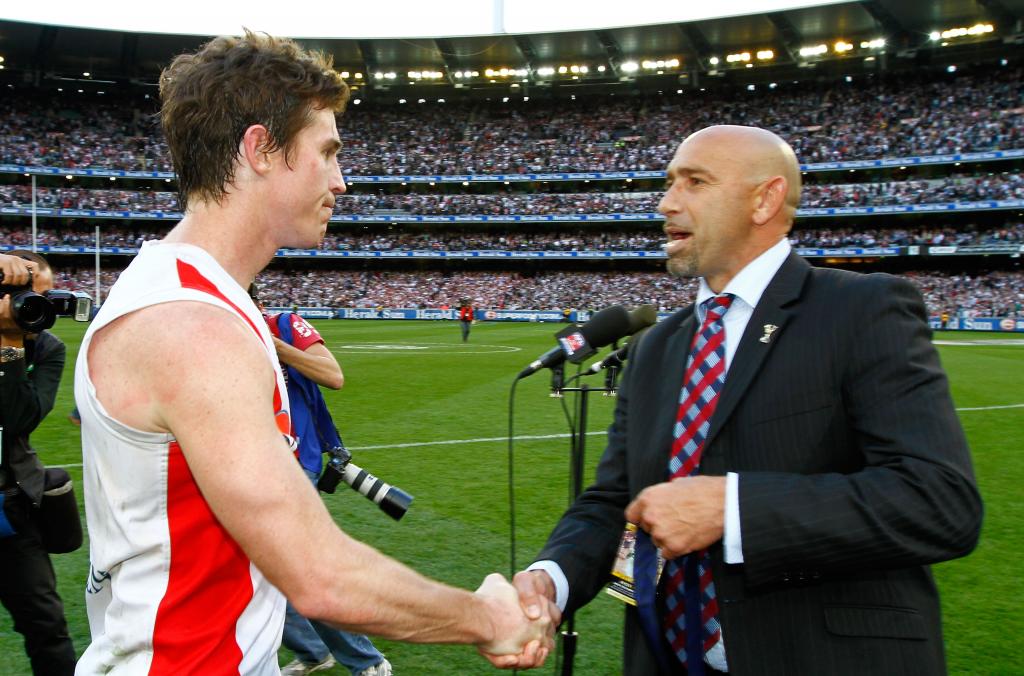
At that point St Kilda, rather than Collingwood, appeared the more settled of the two teams, but McGuire remembered how his club had handled the last drawn Grand Final, 33 years earlier in 1977. The Magpies had cancelled their planned function that Saturday night, while their opponent, North Melbourne, had gone ahead with its. The Kangaroos duly won the replay the following week.
If we treat this as a loss, it will be."
Backing McGuire's instincts, Malthouse agreed that the post-match function should go ahead, and prepared a speech. Many who heard it believed it went a long way to securing the Premiership. The coach implored his players to treat this surreal moment as half-time of the Grand Final. "If we treat this as a loss," he said, "it will be. If we treat this as an opportunity, it will be."
Did Mick Malthouse's rallying cry secure the premiership for the Pies?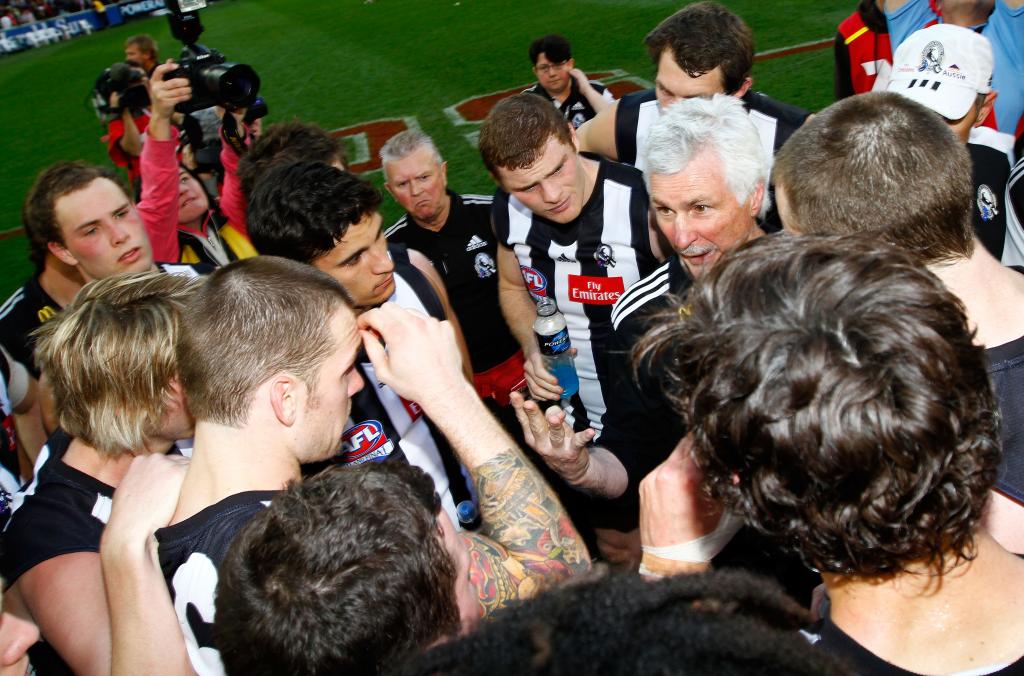
The players bought into the mindset. According to midfielder Luke Ball—who had been part of the Saints' losing Grand Final in 2009 before crossing to Collingwood—Malthouse, "switched the players' minds from wallowing to, 'Oh well, right, it's half time'."
| Year | Score | Replay result |
| 1948 | Essendon 7.27 (69) drew with Melbourne 10.9 (69) | Melbourne by 39 points |
| 1977 | Collingwood 10.16 (76) drew with North Melbourne 9.22 (76) | North Melbourne by 27 points |
| 2010 | Collingwood 9.14 (68) drew with St Kilda 10.8 (68) | Collingwood by 56 points |
The premiership's a cakewalk (second time around)
Following an extra week of intrigue and the hasty organisations of many thousands more Grand Final barbecues, the two sides came together again seven days later. As they had done the first time around, the Magpies started the stronger team. They led 14-0 late in the first quarter when Riewoldt was provided with a chance to make a statement.
Having taken a mark in the goal square, the Saints skipper turned and played on, looking certain to slam through the simplest of goals, but as he marched in and lowered the ball to his boot, Collingwood defender Heath Shaw dived across him to smother the kick and force a behind. Instead of arresting his side's slide, the Saints champion had provided the Pies with a moment that would prove symbolic.
Riewoldt slams through what looked a certain goal, only to be denied by Shaw's heroic dive.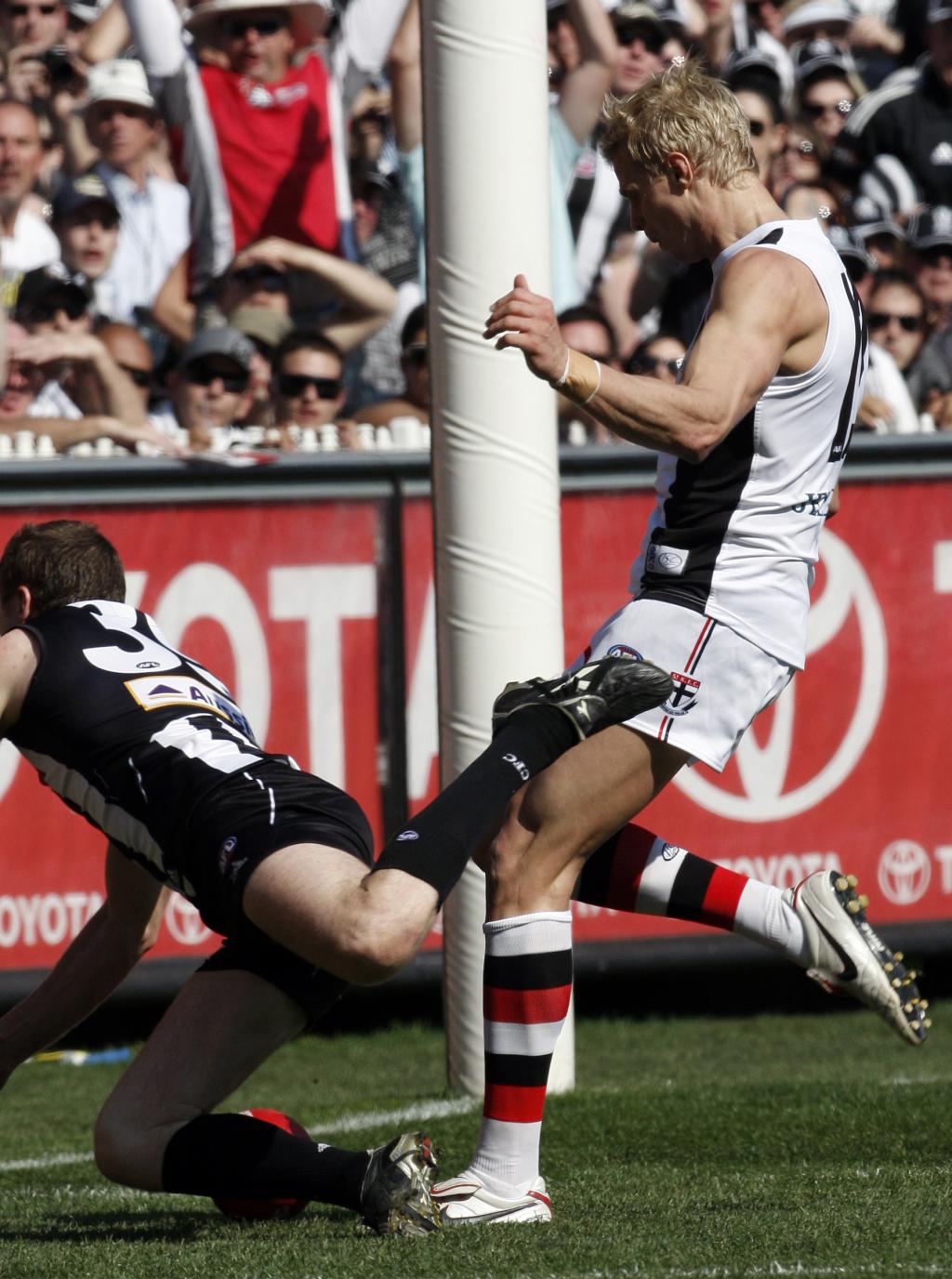
Within a minute Pies utility Brent McCaffer scored a goal at the other end. From that moment, very little went right for the Saints.
As had been the case for Stephen Milne a week earlier, the ball refused to bounce St Kilda's way. Late in the second quarter, with Saints still just within striking distance, ruckman Ben McEvoy looked like comfortably running onto a defensive pass and clearing danger. But in a moment that bookended Milne's heartbreaker, the ball broke cruelly, cleared his head and landed in the arms of his opponent Darren Jolly, who gleefully scooped up the ball and kicked a goal.
Jolly good: the Pies seized on their chances in football's third ever Grand Final replay.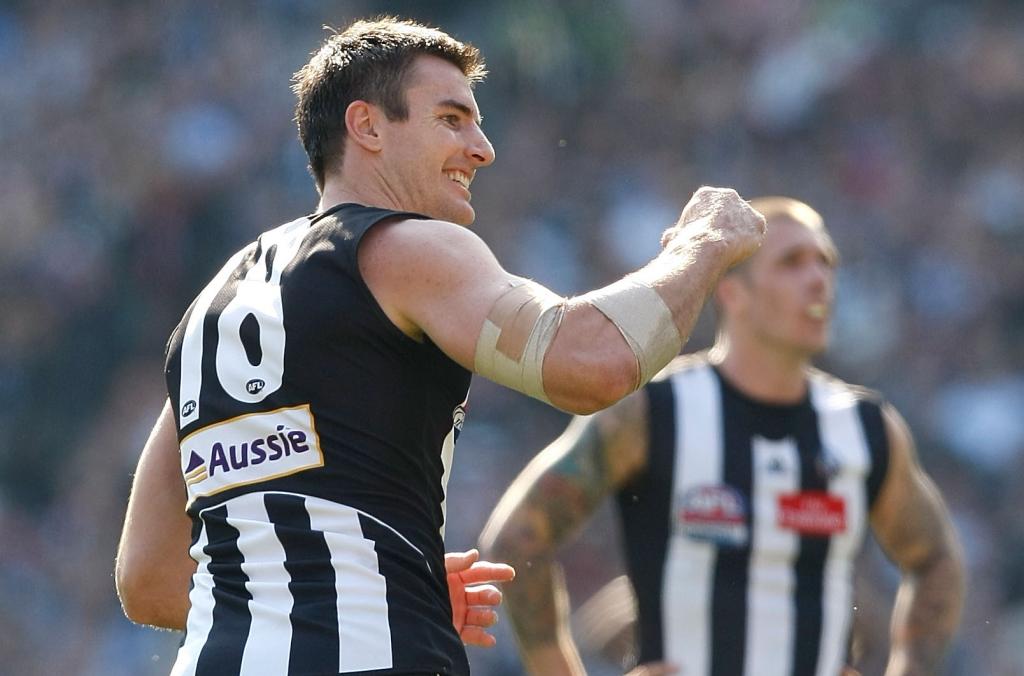
Collingwood led by 27 points at the long break. Its half-time buffer was only three points greater than it had been a week earlier, but St Kilda's spirit was sapped. After half-time Collingwood went from strength to strength, and unlike a week earlier the goals continued to come. Holding firm, it led by 41 points at the final change and cantered to a 56-point win—the biggest of all its 15 Grand Final victories.
Having coped better with the potential distraction of a Grand Final replay than in 1977, Collingwood had ended a 20-year drought.
The spoils of victory: McGuire (r) congratulates Alan Didak (c) while Dane Swan looks on. Below: a shattered Andrew McQualter encapsulates St Kilda's heartbreak. 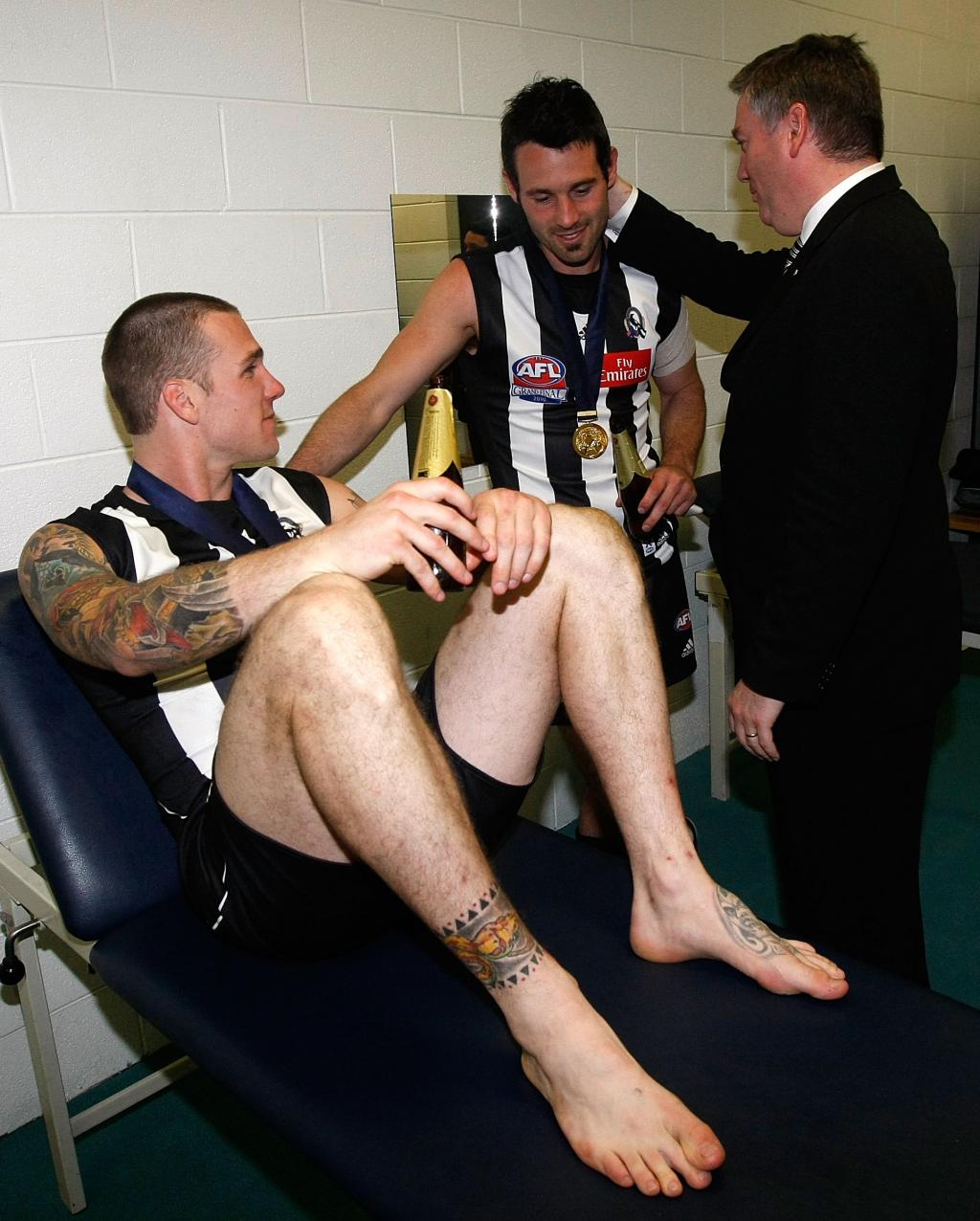
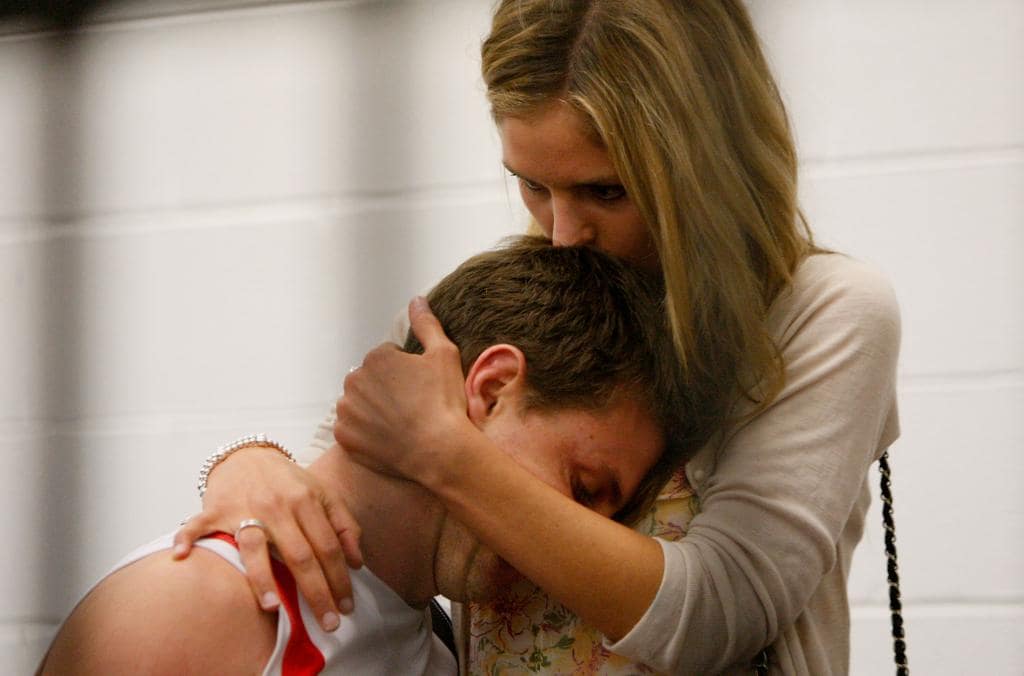
- This is an edited extract from the new compilation Grand Finals vol III, 1979-2018, available at Slattery Media and selected bookshops.



